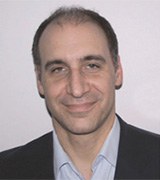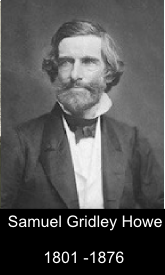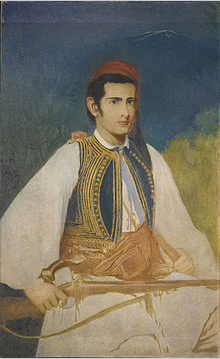Dr. Samuel Gridley Howe: Patriot of Two Nations

Alexander Billinis
Revolutions are often exported. There is no question that the effects of the American Revolution spread far beyond our shores. France followed suit, and several years later, Greeks rose in revolt against a four-hundred-year-old Ottoman regime that oppressed them. Americans were energized by this thirst for human freedom and agency, inspired in part by America’s fight for freedom, and many Americans went to fight for Greece.
In the coming year, as we prepare for Greece’s Bicentennial, it is only just that we as Greek Americans honor our fellow Americans who volunteered to fight and to advocate for Greece, and I seek to start talking about this substantial hall of heroes with a particular standout, Dr. Samuel Gridley Howe.
Dr. Howe was a native of Massachusetts, a graduate of Harvard University who trained as a surgeon. This very technocratic, almost human resources-like description belies the complicated mystery of the man. A “Harvard Man” of the times was a man versed in the Classics, in Ancient Greek and Latin. Often enough, in a time when duels were still fought, such an individual would be a close combat expert, which Howe was. This skill set—linguistic, cultural, and martial—afforded Howe the ability to be immediately and asymmetrically effective when he arrived in Revolutionary Greece.

Samuel Gridley Howe, from Perkins Institute
On the ground in Greece, Howe used these skills in battle with the Turks, tending the wounded, and liaising with key Greek leaders and American and European philhellenes. He chronicled these events in his inimitable Historical Sketch of the Greek Revolution, an absolute must-read for its granular analysis of the revolt and its key figures. While risking his life for the Greek cause, love for Greece did not make him blind; bad or duplicitous behavior from Greek revolutionaries, including by luminaries such as Kolokotronis and Bouboulina, gets called out.
Howe’s service in Greece covered wide geographies, and his narrative reflects a deep sense of history and understanding of the Greeks’ cultural and institutional struggles. While he had the love of the Classical heritage typical of an educated American of his generation, he also understood the Greeks’ Byzantine heritage (which he viewed, correctly, as part of the continuity of culture from Ancient Greece) and the impact that four centuries of Turkish rule had on the state that was trying to be born.
Howe’s activism, both for Greece and for his native country, the United States, did not stop once the guns were silenced with Greek Independence. Like other Philhellenic Americans, he worked to assist Greek war orphans, arranging for many to be adopted and to come to the US. Some returned after adulthood, others remained in the US and often as not, they were great assets to their societies.
Howe’s thirst for liberating the enslaved extended to his fellow countrymen in the United States, the African American slaves. Howe was an outspoken and very active abolitionist, and in many cases he was prepared to confront violent anti-abolitionists with force. His reputation as a combat arts specialist was well known and often defused fights before they began.
Howe remained devoted to Greece, and he returned in 1867 in order to help the young state expand her territory. Crete had just risen in one of this heroic island’s many revolts against the Turks to unite with Greece. Howe came with his daughter, herself a fluent Greek speaker, and even though he was a wanted man by the Turks he went into “unredeemed” parts of Greece still part of the Ottoman Empire, reporting back to fellow Americans about the condition of Greeks still struggling to unite with the fledgling Greek Kingdom.
Howe commissioned an intelligent and resourceful young journalist to be his guide at the time. When the Howes returned to the US, this bright young man, Michael Anagnos, from the Epirote region of Papingo came with them, and eventually married Howe’s daughter.

Howe in Foustanella, painted by son in law John Eliott
Michael Anagnos is a name that should be at least vaguely familiar to most Americans. Along with Annie Sullivan, he was Helen Keller’s teacher. Like his father in law, and, in the tradition of Greek villagers at the time, and particularly in the fastness of the fiercely independent Epriote mountains, Anagnos was well drilled in the combat arts which today we call Pammachon. Further, there is evidence to suggest that neural exercises in Pammachon contributed to Anagnos’ successful teaching of Helen Keller. Among her many accomplishments, Helen Keller also knew Greek.
Dr. Howe lacks the celebrity quality of Lord Byron, who is the go-to Philhellene for most people, and while the latter’s “star power” certainly gained sympathy for the Greek cause, the former’s Yankee know-how and technocracy ended up being more effective both on the field and in gathering support for the Greek cause over decades and generations.
In Howe we have a warrior for justice and liberty for two nations, and a historian who probably best (and most transparently) chronicles the peaks and valleys of an epic struggle. Howe’s practice was to empower others, particularly those less fortunate and in bondage, to seek their own agency. This praxis, combined with a keen intellect, sense of history, and martial ethos, allowed Howe to be an asymmetric force for good, and his son in law Michael Anagnos certainly carried the baton.
It is time we take up the baton, for both countries, in both countries. Howe provides the inspiration and the road map.











0 comments